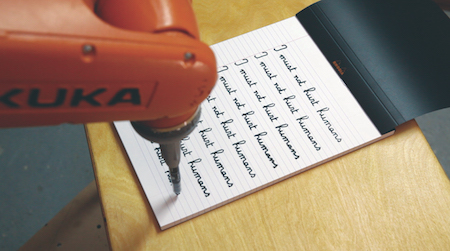While we are more accustomed to seeing such units in action in an industrial assembly line, here it is to draw attention to the reality of robotics today and how they are influencing the real world and can shape the future.
Filipe Vilas-Boas was speaking to Tom Connelly.
The Punishment
In 2015, a year after my exhibition at Nuit Blanche Paris, my friend Paul Coudamy, an architect and designer, aware of my tech interest in my art research, invited me to his studio to show off his brand new toy: a Kuka Agilus KR 10, an industrial robotic arm. As many architects today, Paul was exploring digital fabrication and the use of robotics in his field. A year later I came back to him with an idea of a robot punishment as an artistic project. Interested by our fear and fascination with robots, I wanted to raise some questions regarding automation without being a naive tech utopist or a reluctant technophobe.
“The Punishment” is an installation in which a robot executes a preventive punishment for its possible future disobedience. So clearly, we are here in a dystopian proposition, a possible and feared branch in the future in which robots act and live like us humans. And de facto, punishing it, already means it has its own consciousness.
It's a dark-humoured hypothesis, but we can see it live today: technologies are now merging at high speed, notably robotics and artificial intelligence. It raises a lot of questions about man-machine relation. How automated do we want our world, our body to be? What physical, moral and legal framework should we use? What consequences for human life? Which post-work society shall we build? Shouldn’t the school reinvent itself? At the turn of the century, questions related to automation are popping up in everyone’s mind. We will have to provide answers collectively, if possible.
Future Role of Robotics
I imagine that it’s going to be a huge role, and it could even be a very positive one: freeing humans from a maximum amount of work, creating more value fairly redistributed among society. That's what machines are for, to help us live a better life. The industrial revolution already did its part and robotics can potentially increase it to a large degree, which is good news for everyone. But this scenario implies a new social contract and probably a massive social battle in the near future. If it doesn't happen, then we will certainly observe the development of the precarious fringe of our societies.
That being said, from a wider point of view, we shouldn't only talk about robotics but automation in general and it concerns various other fields as nano, bio and neurotechnology. Automation has already colonised our digital life. As an example, adtech algorithms in use online do already transform and bias our digital experience. Transhumanist research is obviously bringing those issues to our bodies.
What about the possibility of robot teachers? I'm not hinting at it, they are already part of our life. Furthermore, a possible future path of our species consists of a man-machine mix. According to it, we'll be partly robotic so we can't just split humanity on one side and robot on the other. Neuroscience studies show that we are discovering, mapping our brain today as we mapped the planet a few centuries ago. We are currently assisting at the beginning of it which is very exciting but we all – as humans – can't remain seated watching the show. We need to discuss all those issues together. And that really was a goal to achieve for me putting out this installation.
Fears over automation are very real. Firstly regarding to the manual work it will replace and secondly for the cognitive tasks. Artificial intelligences are getting better and better at producing jobs we couldn't image a few years before.
Kuka Robotic Arm
Threat of Singularity
The line that the robotic arm writes, “I will not hunt humans” suggests a fear of a domesday scenario all too familiar from blockbusters. That fear is indeed real, but we have to exorcise it. The installation shows a robot punished by humans and to me this is a duplicate of the original divine punishment (title of the piece). We, humans, are looking at machines accessing in their turn to the knowledge tree. And in a certain way, it fears us to hell because it destabilises the genuine paradigm of computing : "master-slave".
Science fiction has given us the three laws of robotics, are they sufficient for our needs or just a starting point? Harry Harrisson wrote a story in 1989 entitled "The 4th law of robotics" in which robots claim the right to reproduce themselves, as humans do. I guess laws must anticipate or at least follow the evolution of society.
Honestly I don't know how to answer this. But regarding algorithms in general and particularly all the data we produce online, I do feel that we need a personal tool to manage our rights. Companies are making a big profit capitalising on them, and giving nothing back except the right to use their platform for some of them only. As life happens more and more online, we need universal tools – legal ones too – in order to build our digital armour.



.jpg)
.jpg)
.jpg)

.jpg)




.jpg)